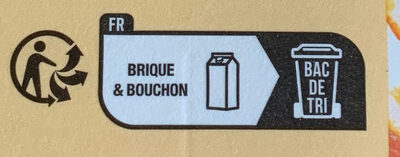Pur jus d'orange - U - 1 l
Some of the data for this product has been provided directly by the manufacturer Système U.
Barcode: 3256220369947 (EAN / EAN-13)
Common name: Jus d'orange pressé
Quantity: 1 l
Packaging:
Bottle cap, Brick, Cardboard, Wine cork, FSC C014047, FSC Mixte, Green dot, Tetra Brik Aseptic, Triman, fr:Brique carton et son bouchon à recycler, fr:Pensez au tri!

Brands: U
Categories: Plant-based foods and beverages, Beverages, Plant-based beverages, Fruit-based beverages, Juices and nectars, Fruit juices, Orange juices, Squeezed juices, Beverages with orange, Squeezed orange juices
Labels, certifications, awards:
Low or no sugar, No preservatives, FSC, Green Dot, No added sugar, No colorings, Nutriscore, Nutriscore Grade C, Pure juice, Rich in vitamin C, Transformed in France

Origin of the product and/or its ingredients: Espagne
Origin of ingredients: fr:Hors France
Manufacturing or processing places: Bric Fruit [Filiale de Fruité (Groupe Britvic)] - Lieu dit La Jaunaie - 44690 Château-Thébaud, Loire-Atlantique, Pays de la Loire, France
Traceability code: EMB 44037 - Château-Thébaud (Loire-Atlantique, France), FSC-C081801
Stores: Super U, Magasins U
Countries where sold: France
Matching with your preferences
Report a problem
Data sources
Product added on by nvallas
Last edit of product page on by aleene.
Product page also edited by beniben, cestki13, date-limite-app, desan, foodviewer, jacob80, kiliweb, manu1400, off.d42ebd1d-8495-4346-895e-3192413d0622, openfoodfacts-contributors, org-systeme-u, packbot, quechoisir, roboto-app, spotter, sqoia, systeme-u, systeme-u-off, tacite, tacite-mass-editor, teolemon, yuka.UTRSY0ViazdpdXNCaS9NNnhnbjg2K2xvbW8yRFhHMlZDTXM2SVE9PQ, yuka.UTRvOEVvaGF1YVV4aHYwdTlEZm45NE54L2JXUlJHYTJLUFVTSVE9PQ, yuka.V2J3c1BZVUkrdmMyZ2Rzc294NzMvdmxRd3JLa0RVMitGZXc4SVE9PQ, yuka.VnI1ZkFxWW5wZUVzbU1ZYXJqL3pwb3gzK2NXalFueWVMZXMvSVE9PQ, yuka.YTU0L0Nxc091cU1ubi9JVDlTblMwK2dxeXJtVGVFRzdOYzhESVE9PQ, yuka.Zi9vUkdab3p1dWhieXNjMTV3L0UxLzVNMXBhc2VESzRFdXdwSVE9PQ, yuka.ZmE0Uk1hMGZ1c1F0c3ZJbjB4MysrTUoxOTcrR1RYR1REYzhMSVE9PQ.
Last check of product page on by aleene.












